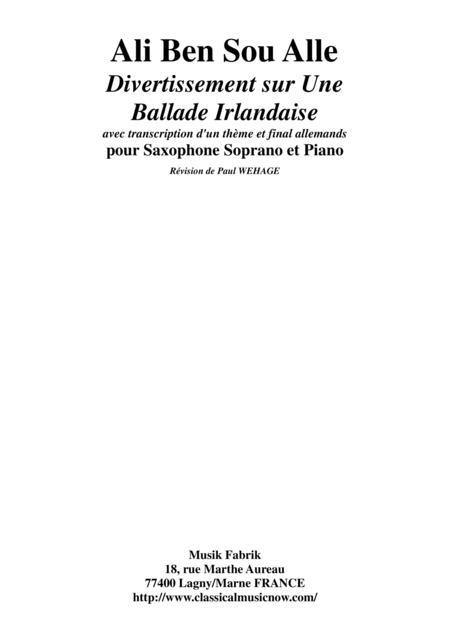Instrumental Duet Instrumental Duet,Piano,Soprano Saxophone - Level 4 - Digital Download SKU: A0.533210 Composed by Ali Ben Sou Alle. Arranged by Paul Wehage. Concert,Folk,Holiday,Romantic Period. Score and parts. 17 pages. Musik Fabrik Music Publishing #1986205. Published by Musik Fabrik Music Publishing (A0.533210). One of the most enigmatic figures in the history of the Saxophone, Ali Ben Sou Alle (c was born in 1820 in Arras, France. After receiving his first prize in Clarinet at the Paris Conservatory in 1844. he served as the director of music of The French Marine Band in Senegal, and then was named first clarinet solo at the Opéra-Comique in Paris. However, after the Revolution of 1848, Soualle was forced to flee France to England where he settled in London, playing in the Orchestra of the Queen's Theatre. His songs and piano pieces were published in London. While in London, Soualle met another exiled French musician, Louis Antoine Jullien, who conducted a light music series in London. Jullien encouraged Soualle to take up the saxophone, and after modifying the instrument by adding a single octave mechanism (the modern system used today) and keys for the lower register, Soualle became known as a virtuoso and began touring performing solo recitals (or mono-concerts, as they were called at the time). He performed in all the European capitals and then traveled to Australia, New Zealand, Manilla, Java, through China and then to India where he finally settled in Mysore, becoming the director of the Royal Music for the Maharadjah. It was during this period that he converted to Islam and changed his nmae to Ali ben Sou Alle (or Ali, son of Soualle). He subsequently travaled to Ile Maurice, to French Polynesia, the Cap of Natal and the Cap of Good Hope. All of these voyages were subjects of musical works which Soualle entitled Souvenirs de... and may perhaps have been part of a collection known as The Royal Album which was presented to the Prince of Wales after a royal concert. Soualle returned to Mysore in 1858 and was almost killed in the Indian Revolution. Around 1860, Soualle returned to France for health reasons and began publishing his own music. On March 27 1865, he performed a command performance for the Emperor Napoleon III at the Tuileries Palace in the presence of the entire Imperial Family. After 1865, nothing more is known about him. Divertissement sur Une Ballade Irlandaise begins with a lyric introduction in bel canto style. The Irish Ballade is named in the score as « My Lodging is on the Cold Ground », but is sometimes known as « Believe Me If All Those Endearing Young Charms » and is followed by a brilliant variation. After an ornamented modal passage in 6/8, the allemande theme is presented first in a moderate tempo, and then in a more rapid variant which uses « cross string » figerations similar to those used by fiddlers.
